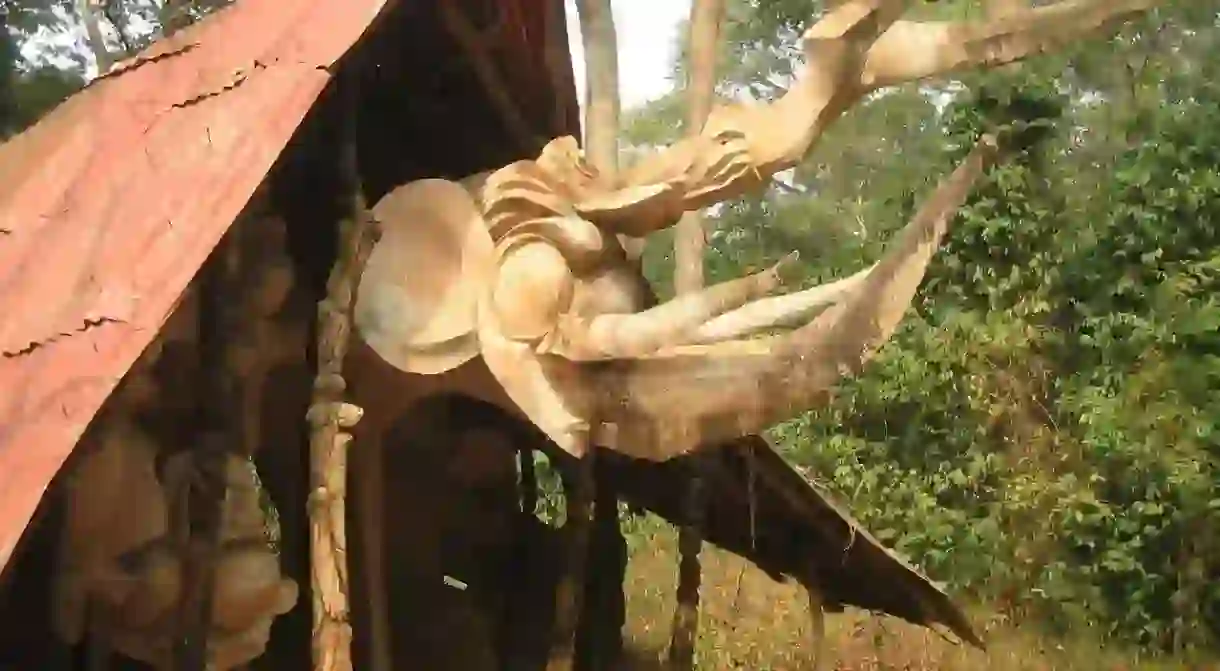11 Nigerian Artists Who Have Been Influenced By Oshogbo's Mystique

Nigeria’s art has always been linked with her spirituality. This is reflected in the Igbo Mbari Houses (Mbari is a creative concept in Igbo) and Oshogbo Art, which is intrinsically linked with Osun, the god of the Osun River, which runs through that same town.
In 1962, heavily influenced by Yoruba Culture, Ulli Beier, a German Jew, co-founded the Mbari-Mbayo (which translates to “that I may see, that I may be joyful” in Yoruba) with the dramatist Duro Ladipo. Out of this came the Oshogbo School of Arts, which is inextricably linked with Susan Wenger and Osun (the spiritual Mother All).
Nike Okundaiye
Known for her works in batik and paintings, Nike Ogundaiye is one of the leading artists heavily influenced by the Oshogbo mystique and her background in weaving and dying. She presently owns multiple art galleries in Oshogbo, Lagos, and Abuja, and acts as a mentor and teacher to upcoming artists through her Arts Centre. Her works are permanently featured at the Smithsonian.

Twins Seven-Seven
An itinerant singer and dancer before becoming an artist, Prince Twins Seven-Seven is a sculptor, painter, and musician. His works are heavily influenced by the Osun deity and the Abiku phenomenon. His work embodies dualities, a reflection of his Yoruba background. In 2005 he was designated a UNESCO Artist for Peace.
Muraina Oyelami
A master painter and performing artist, Muraina Oyelami is often described as a “poetic painter with a romantic touch.” He composed and directed the music for Wole Soyinka’s famous Death and the King’s Horseman and still paints from his hometown, Iragbiji, on the outskirts of Osogbo.
Jimoh Buraimoh
Another member of the Mbari Mbayo club, Jimoh Buraimoh is known for his mosaic compositions made with beads, potsherds, and stones. He also works stained glass and prints. He was designated Africa’s first bead artist in 1975 and is presently the vice-chairman of the Osun-Osogbo Grove Management Committee.

Yinka Adeyemi
A native of Iragbiji, Yinka Adeyemi was one of the original members of the Osogbo school; he also worked on the restoration of the Osogbo Grove alongside Susanne Wenger. He specializes in batik on rice paper (or cloth) and also works in bead mosaic paintings and tapestry. He was an artist-in-residence at the Obafemi Awolowo University, Ile-Ife.
Asiru Olatunde
Trained as a blacksmith and working as a jeweler, Asiru Olatunde, with encouragement from Ulli Beier and Susanne Wenger, began to work on larger panels using copper and aluminum. His works are in the Smithsonian Institute.

Buraimoh Gbadamosi
Formerly a carpenter, Buraimoh Gbadamosi was encouraged to try relief carving by Susan Wenger. He eventually turned to stone, the medium through he became an established artist. Gbadamosi is deeply involved in the egungun masquerade cult, which he practices alongside Islam.
Adebisi Fabunmi
Adebisi Fabunmi started out as an actor in Duro Ladipo’s theatre troupe and went on to train with Georgina Beier in Osogbo. Inspired by the Huichol Indians of Mexico he developed a method of adhering yarn to the backing of heavy muslin or plywood. He presently works as a printmaker.
Adebisi Akanji
Formerly a bricklayer, Adebisi Akanji started his artistic walk when he took part in a competition where cement animals were sculpted based on architectural elements in Yoruba houses. He worked with Susan Wenger for ten years on the architectural designs of the Osun Grove and is responsible for a large part of the sculptural elements in the shrine.
Susan Wenger
Also known as Adunni Olorisa, Austrian born Susanne Wenger is both a product of and an influencer in the arts and spirituality of Osogbo. She was the guardian of the sacred grove of Osun and a priestess.

Tunde Odunlade
One of the protégées of Yinka Adeyemi, Tunde Odunlade is a musician and folklore griot and artist who works in batik (rice paper and cloth) and formulated a batik applique for wall hangings with unique depth and texture. His works are featured at the Smithsonian and the Victoria and Albert Museum in London.













